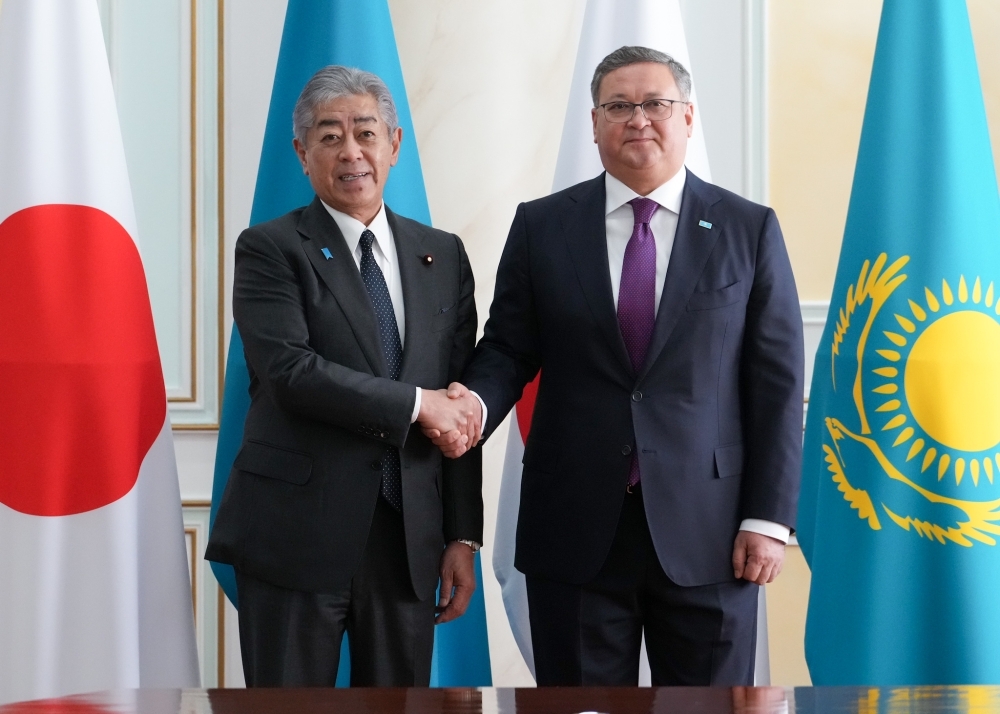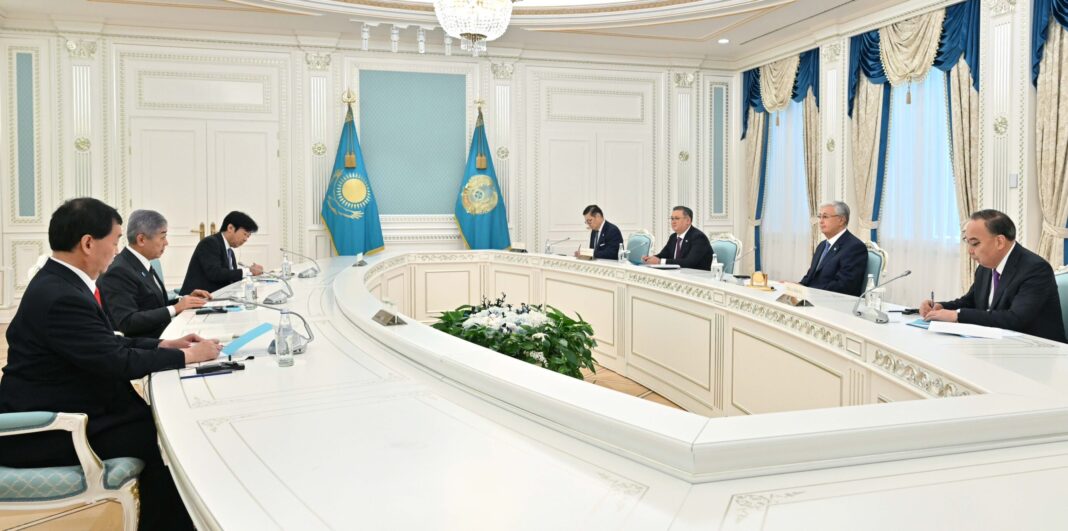By Assel Satubaldina in International
ASTANA – Japanese Foreign Minister Takeshi Iwaya is on an official visit to Kazakhstan on Aug. 24-26, meeting with President Kassym-Jomart Tokayev and his Kazakh counterpart Murat Nurtleu. The key objective of the visit is to facilitate stronger ties with the region and to discuss the preparations for the high-level Japan-Central Asia meeting.
Japanese FM Takeshi Iwaya also met with President Tokayev. Photo credit: akorda.kz
“Today, Central Asia is demonstrating steady economic development, and its importance as a trade route connecting Europe and Asia continues to grow. At the same time, Japan recognizes that the countries of the region are experiencing a significant impact from the changing international situation. It is precisely now, amid the rapid changes taking place around Central Asia, that regional cooperation in Central Asia is becoming a necessity,” writes Takeshi Iwaya in his article published on Aug. 23 in the Kazakhstanskaya Pravda newspaper.
He described the visit’s main goal as deepening ties with Central Asia while working together to uphold a free and open international order grounded in the rule of law.
High-level talks
Meeting with Minister Iwaya, President Tokayev reaffirmed the country’s willingness to strengthen relations with Japan, which he described as a “reliable partner in Asia.” Tokayev commended the positive momentum in bilateral ties.
During the meeting with Nurtleu, Iwaya welcomed the continuing high-level dialogue between the two countries. He underscored Japan’s interest in strengthening cooperation in the economic area, including via the Joint Crediting Mechanism, mineral resources and attracting Japanese companies to Kazakhstan.

Foreign Ministers Iwaya and Nurtleu shake hands during their bilateral meeting in Astana on Aug. 25. Photo credit: mofa.go.jp
Nuclear disarmament and non-proliferation remain central to bilateral cooperation. The two ministers also signed and exchanged notes on grant aid for the Economic and Social Development Program, which includes support for victims of nuclear testing and the provision of medical equipment.
Central Asia+ format
Japan was the first country to initiate a Central Asia+ format with the region in 2004, pioneering a format that later became a template for the region’s engagement with other foreign partners.
The high-level Central Asia + Japan summit was slated for Astana in August 2024, with then-Prime Minister Fumio Kishida expected to attend. His trip, however, was cancelled at the last minute after a powerful earthquake warning in Japan. The last visit by a Japanese prime minister to Central Asia dates back to 2015.
“We believe this is not a competition between Japan and other countries. We would like to see Central Asian countries work together with other parts of the world,” said Toshihiro Kitamura, press secretary and director-general for press and public diplomacy at the Japanese Foreign Ministry, in a comment for this story.
“Our main purpose was to work as a catalyst to promote interconnectivity and inter-regional cooperation,” said Kitamura.
Many things have changed since 2004, including the dynamics in the cooperation between Central Asian countries, which has grown substantially stronger.
“We are very happy to see that unity and connectivity within Central Asia have been strengthened, partially because of the improvement in the relationships between the five countries. Your countries hold summit meetings regularly,” Kitamura said, highlighting the importance of a stronger agency of the region.
He stressed Japan never sought a teacher-student dynamic in its relations with its partners. Instead, it aims to build partnerships rooted in joint work on the ground.
“Japan is not a superpower in terms of military or politics, but economically, we have power, and by utilizing this economic and soft power, as a catalyst, we wanted to promote, once again, cooperation among Central Asian countries. Since this objective has almost been achieved, now we try to shift our focus to concrete cooperation with Central Asian countries,” he said.
Key areas of cooperation
There are several priority areas for Japan’s engagement with Central Asia, the ones that ministers Iwaya and Nurtleu also discussed during their bilateral meeting in Astana.
Energy, decarbonization, and connectivity are on top of the bilateral agenda. Japan is reconfiguring its own energy and climate goals, as it seeks to achieve carbon neutrality by 2050, ten years earlier than Kazakhstan’s target.
Kitamura explained that to meet the growing power demand and fulfill its climate goals, Japan is also restarting the operation of nuclear power plants, which had been suspended after an earthquake in 2011.
“We also focus, as your country, on renewable energy, such as solar, wind, and hydropower,” he added.
Japan wants renewable energy to account for up to 50% of its electricity mix by 2040, with nuclear power accounting for another 20%. Recognizing Kazakhstan’s vast potential in wind and solar, Kitamura said Japan is seeking to expand cooperation with Kazakhstan, including through initiatives such as the Joint Crediting Mechanism.
Trade dynamics
Bilateral trade hit $1.8 billion in 2024, according to the figures from the Kazakh Bureau of National Statistics. Kazakh exports to Japan reached $506 million, and Japan’s imports to Kazakhstan amounted to $1.3 billion.
Metals and metal products, led by ferroalloys at over 50%, form the bulk of Kazakhstan’s exports to Japan, complemented by oil, coal, solid fuels, chemicals, and plant-based goods.
Kazakhstan’s imports from Japan are led by automobiles, trucks, and heavy machinery, including bulldozers and graders, along with medical instruments, devices, and rubber tires.
Japan is among the top 10 largest foreign investors in Kazakhstan, with a total investment volume surpassing $8 billion. According to the National Bank of Kazakhstan, in 2024, the gross volume of foreign direct investment from Japan exceeded $468 million.
More than 60 Japanese companies are registered in Kazakhstan in such areas as oil, gas, petrochemicals, metallurgy, finance, mining, telecommunications, medicine, and agriculture. Kitamura highlighted that Japanese companies are increasingly keen to enter the Kazakh market.
Cultural and humanitarian cooperation
Kazakhstan and Japan are also keen to deepen their people-to-people contacts.
Officials also welcome the expected launch of direct flights between Astana and Tokyo in March next year, based on a partnership between Air Astana and Japan Airlines. The ministers underscored the significance of this move to elevate bilateral relations to a new level.
Kitamura also noted that a substantial effort has been made to repatriate the remains of Japanese nationals who were exiled to Central Asia for forced labor at the end of World War II. Many had contributed to the construction of key buildings in the region, including the Navoi Theater in Tashkent.
According to the Kazakh Embassy in Japan, a total of 58,900 Japanese soldiers were exiled to Kazakhstan, of whom around 50,000 subsequently returned to Japan. The remains of 188 Japanese soldiers have been returned to their homeland.
The visit of the Japanese foreign minister will continue in Uzbekistan through Aug. 28.
Original URL: https://astanatimes.com/2025/08/tokyo-steps-up-central-asia-engagement-with-high-level-foreign-minister-visit/
INPS Japan/ The Astana Times


